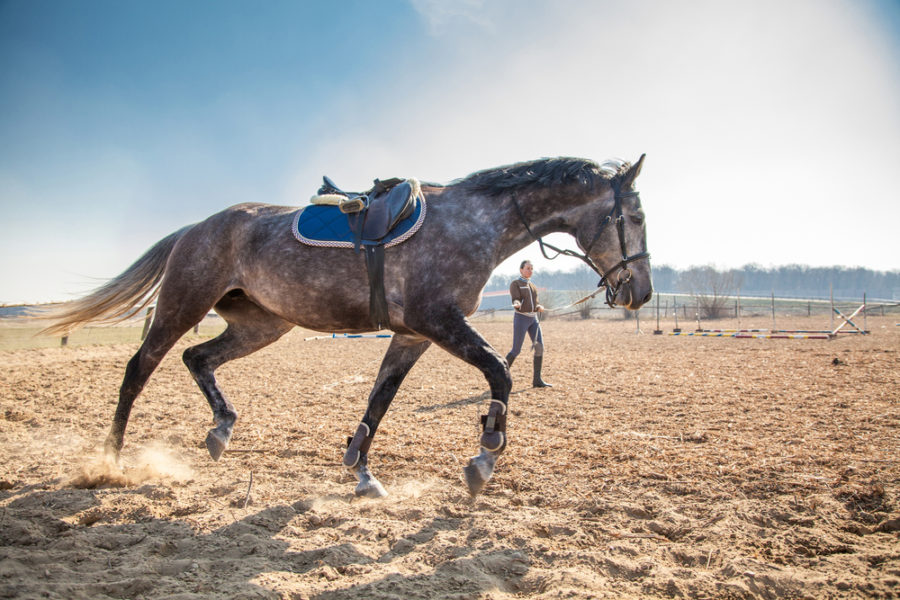Competition season is upon us, which means it’s time to condition your equine companion to perform at his best.
Horse caretakers want results from training, and victories in the competition ring. And that’s understandable. But to expect great things out of our horses, we have to put great things into our horses. We need to provide them with training programs that keep them happy and eager to please, and offer nutritional support to ensure they can meet the energy requirements they need. Training really starts from within, and there are a number of steps you can take to prepare your horse – both mentally and physically — for competition.
Step 1: Get to know him
When training a horse for competition, understanding his behavior is critical. When a client drops off a horse, or a horse comes in for a clinic, I evaluate him right there and then. Is he brave, nervous or anxious? Can he focus on me as the trainer or am I non-existent? Understanding what is happening in his mind helps develop a plan for training.
Each horse is an individual, just like a person, and has to be trained in an individual way. I do not coach to all riders the same; I take into account their personalities, riding levels and past riding experiences. A fearful rider would not appreciate a coach pushing her into situations that cause more fear and anxiety; instead, a slower approach may be needed to build more confidence. So why would we teach the horse any differently?
Step 2: Pinpoint the root of any issues
A good trainer should be able to understand the root cause when a horse isn’t able to perform a particular task. Does he not understand? Is he being stubborn or fearful? Perhaps he cannot physically do the exercise. As I travel across the country doing clinics, I see all different levels of horses and riders. What I discovered is that the quicker I am at determining the root cause of an issue, the quicker I can help the horse and rider become successful.
Step 3: Be a good leader
There is nothing to be gained from forcing a scared horse to do something. Instead, be a good leader – one who is fair and forgiving, yet leads with authority. Be a leader who a horse can turn to for guidance and security. If the horse feels you are the one to take care of him and keep him safe, training becomes easier. If the horse doesn’t understand what you’re asking him to do, then it’s your job to figure out how to communicate it in a way he understands. Can you break the exercise down into smaller steps, or go slower? Figure out what he needs from you.
 Be prepared for situations in which a horse may not be able to do what you want because of physical limitations. Be fair, and know that not all cow horses can be western pleasure horses or jumpers, and vice versa. Going back to step two – taking the time early on to understand and address the root cause of his resistance – makes for faster progress overall.
Be prepared for situations in which a horse may not be able to do what you want because of physical limitations. Be fair, and know that not all cow horses can be western pleasure horses or jumpers, and vice versa. Going back to step two – taking the time early on to understand and address the root cause of his resistance – makes for faster progress overall.
Step 4: Consider the whole horse
I am a firm believer in whole horse wellness. I want my horses to be comfortable all the time and to enjoy their jobs. I want each of them to be waiting for me at the gate with an eager look that says, “Hey, let’s get this show on the road! What are we doing today?”
If a horse is sore or uncomfortable, you can’t expect him to enjoy being ridden or to perform well. Horses that are pushed when they’re in pain can become sour – and can develop serious health issues – so it’s very important that they’re taken care of on a regular basis. Dental care, chiropractic appointments and hoof care, in addition to general veterinary exams, are crucial.
Step 5: Feed him well
In order to build a horse that’s physically and mentally ready for training and competition, you need to start from within. A good trainer should have a feed and supplement program that they wholeheartedly believe in. We feed a low-starch alfalfa-based extruded feed to keep our horses in top shape without the highs and lows caused by sugar-rich products. We also feed an alfalfa-grass blend hay to meet energy demands, using slow feeders so our horses are constantly grazing 24/7. Remember – how you feed your horse is just as important as what you feed.
I also believe in using supplements to support joint and internal health by turning to trusted high quality brands. I’m concerned with gut health all the time as well. Training and competing can be stressful on a horse, and that can affect his gut, so supplements that promote healthy digestion are helpful.
A horse is not a machine, but a living, thinking, feeling animal that deserves your dedication and care. As his caretaker, it’s your job to give him every opportunity to perform at his best. I choose to manage horses as naturally as possible, which involves ample turnout time, a healthy diet, and plenty of one-on-one attention. If you help your horse become as healthy and happy as possible, he will want to do the work you ask of him.







